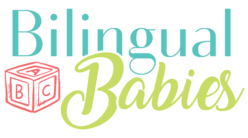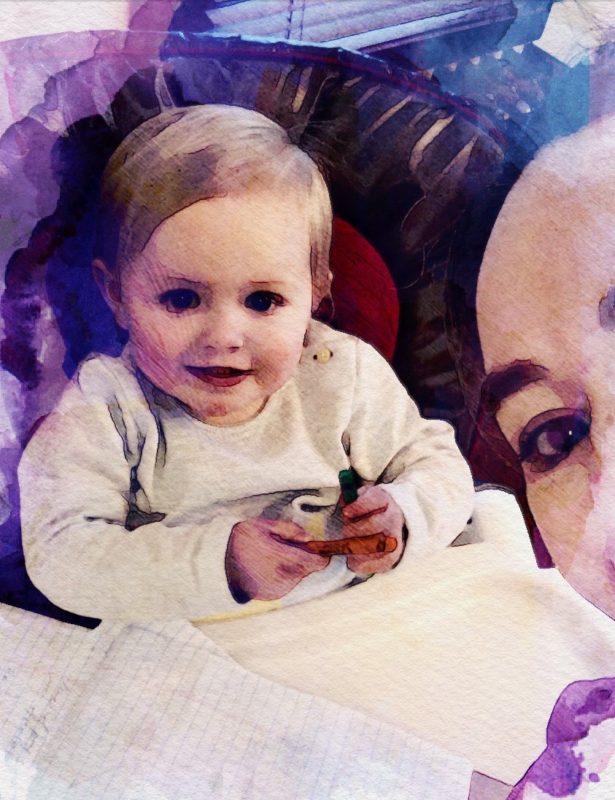As a family we have adopted the one-parent-one-language (OPOL) approach to raise our daughter Ella with two languages. That means, each of us speaks one language to her. My husband speaks English to Ella and I speak German. Plus, we live in the United States so German is our family’s minority language. Research has found that amount of exposure and consistency with which a language is used are key to a child learning that language.  Translation for me: consistently expose Ella to German and speak it to her as much as possible—ideally all the time! But then I found myself struggling with a particular situation:
Translation for me: consistently expose Ella to German and speak it to her as much as possible—ideally all the time! But then I found myself struggling with a particular situation:
Should I speak and stick to my German-only approach out in the community when others are around who may not understand German?
Apparently, I was not alone with that question. Recently, I learned that I was not the only one who was struggling with that situation. Some parents even felt rude or awkward speaking their native languages to their children when others were present who did not speak the language. While Ella is still a toddler and thus too young to really complain about me speaking German, your child might be older and feel embarrassed and refuse to speak with you in front of other people.
So what can you do? What is the best way?
Well, the answer is: it depends! While some parents strongly believe in speaking only their language irrespective of the situation and people involved, others feel that they need to switch to the majority language. Personally, I think for me the answer lies somewhere in-between. Here is why and what I’m doing:
As a general rule of thumb, I am trying to stick to German as much as possible at all times—even if it sometimes takes a conscious effort not to switch into English. I do that for two reasons:
- I think it’s important to give her the much needed input and exposure.
- I believe it’s important for Ella to see me use the language in front of others to convey to her that it’s perfectly fine to speak German and that it is nothing that you need to hide in front of others.
Additionally, I found that it actually had positive effects—beyond providing Ella with the much needed input and exposure. For example, when I drop Ella off or pick her up from daycare, I use only German when I speak to her. While it felt awkward in the beginning (I felt like I was excluding the teachers), it has become quite normal to the extent that I even caught myself speaking German to the other toddlers at times (they don’t really seem to mind at that age).
Also, I noticed that some of the teachers were picking up a few German words and tried to incorporate them for Ella into her daily routine. For example, for the first time this morning the headteacher greeted Ella with “Guten Morgen!” I was both surprised and super excited to hear that! Also some of the teachers have started to ask me for certain words in German (and how to pronounce them) so they can use them with Ella throughout the day. Another teacher joyfully shouts “tschüss”—her only German word—every afternoon when Ella and I leave the daycare. While it obviously depends on the open-mindedness and willingness of daycare staff to incorporate a language, I believe that it was in part my using and thus highlighting the importance of the language which resulted in them embedding German more and more for Ella.
However, despite me trying to use it as much as possible, I occasionally find myself in situations out in the community, among friends, or fellow moms in which I feel that I do need to fill everybody in so I do need to switch to English. What I’m trying to do in these situations is this: I try to always say something in German first before I repeat the important pieces in English. I guess my hope here is that Ella will process the message (in German) immediately so she pays more attention to the German input. That way, I do provide the German input. Beyond that, I can show her that it’s also okay to be flexible with languages and change back and forth depending on the situation.
Overall, I think every situation is different and as a parent we have to make the decision what language we use when, where, and with whom. Also, as children get older additional challenges might occur such as kids feeling embarrassed when a parent uses the minority language—simply because they want to be like everyone else. We are not at that point yet so I cannot speak to that challenge out of experience. But I would love to hear other parents’ strategies. What approach have you adopted? Do you remain consistent and stick to your language? Do you switch between languages? Have you experienced other challenges?
Many thanks for reading!



2 comments
I experience similar challenge. Me and my husband speak only Polish with my daughter. We also live in USA but for me it is so weird to speak with her in English. It doesnt feel natural to me 😛 when we are out and there are some American kids, I speak with her in Polish but I feel it is not ok with others so sometimes I repeat the same sentence in English. My daughter is 2 years old she doesnt speak English yet, just Polish and I see that this language issue is a problem for her. She doesnt like to play with kids cuz she doesnt understand them. She just want to play with our polish friend’s kids. So maybe we should start to talk with her in English in public. I dont know 🙉
Hi Agnieszka,
I feel you! 🙂 It’s always a balancing act. The fact that your daughter speaks only Polish is actually really good! English will be dominant as soon as she starts preschool or school. To make it easier, you can gradually expose her to more English before she starts school, but in any way she will most likely catch up super quickly once she goes to school. At he moment she may be reluctant to play with English-speaking kids because she is more comfy with Polish, but my prediction is that as soon as she starts school she will catch up with English and will also be English dominant at some point. That’s when tables may turn and you find yourself having to promote Polish more and more. So the more you can promote the Polish language early on, the better the chances that she will maintain her heritage language in the long run. Good luck and keep in touch!!